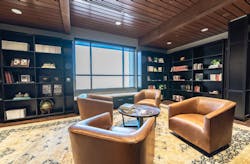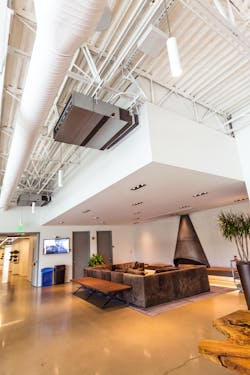Emerging "Resimercial" Market Will Demand More HVAC Versatility
When the COVID-19 pandemic began, much of our country’s in-office workforce grew accustomed to taking calls and filing reports from their kitchen tables or even their bedrooms. Remote work became so prevalent that it blurred the line between professional and home life across the U.S. and also elevated employee expectations for comfort while working.
Today, as businesses encourage more and more of their remote workers to return to the office, building engineers and designers have faced growing demand for corporate working environments that foster productivity and a flexible, relaxed and even "homey" feel. For that reason, the relatively new concept of “resimercial”, which seeks to blend the best of both the residential and commercial worlds, is now growing in many downtown markets.
Increased Focus on IAQ
The comfort and aesthetic of an indoor environment play a huge role in how we use a space. Successfully curating a resimercial facility involves the thoughtful selection of décor, furnishings and building systems such as lighting, heating and air conditioning.
So, what’s the ideal HVAC choice for a resimercial project?
A heating and cooling system with flexibility, efficiency and customized controls. For smaller spaces, an all-climate heat pump system fits the bill, while larger commercial facilities benefit from Variable Refrigerant Flow (VRF) technology.
Both systems deliver superior, reliable comfort by transferring heat from one area to another with refrigerant. VRF systems and all-climate heat pumps use inverter-driven compressor technology to reach and maintain temperature set points without the noisy, distracting and inefficient on/off cycling of conventional systems.
They also offer zoning capabilities for customizable comfort. Each zone can have an individually controlled indoor unit. Residential and light-commercial heat pump systems support up to 12 indoor units per outdoor unit, while commercial VRF systems can support up to 50 indoor units per outdoor unit. If equipped with a branch circuit controller, VRF zoning systems can use heat recovery to cool some zones while simultaneously heating others.
Resimercial Requires Versatility
If resimercial is about making our commercial spaces feel like home, then incorporating versatility and customized comfort should be the natural first step.
Toward that end, the personalized control offered by heat pumps and VRF technology opens a world of possibilities for how people interact with their workplaces. When employees feel too hot or too cold at work, for instance, their productivity and mood can suffer. So, having control over the temperature of their space can improve a person’s performance and overall sentiment toward their work.
Future Opportunities
Once we’ve made buildings more comfortable using these technologies, new possibilities will emerge as this market evolves, broadening the definition of resimercial. One increasingly popular, but expensive example, is the conversion of former commercial spaces into residential apartments.
“Urban loft”-style living has been a trend for decades, of course, but those warehouses-turned-apartments often lacked a genuinely home-like atmosphere. They often required extensive renovations and system updates, as well. While challenges regarding the profitability of conversions are still being addressed, in the meantime, building owners are including amenities such as shopping and dining to attract tenants. In this way, as commercial spaces prioritize comfort, they’re better positioned for seamless transitions into residential use and can offer improved resident experiences.
Conclusion
Resimercial design is becoming increasingly popular worldwide, especially in densely populated cities, as more building industry professionals and business owners understand how well-being and comfort preserve and enhance a property’s value.
With that in mind, it is already evident that heat pumps and VRF systems are ideal for resimercial applications, offering energy-efficient, versatile and comfortable temperature control solutions to meet the demands of modern workplaces. Investing in all-climate heat pumps and VRF zoning systems can help building owners create a more comfortable and productive environment for their tenants while enhancing the building’s market potential. Truly a win-win all the way around.
##########
Based in Suwanee, GA, the author is a senior executive at Mitsubishi Electric Trane HVAC US (METUS). Smith has more than 25 years of industry experience and now manages the strategic marketing communications and promotional activities for both residential and commercial businesses.
About the Author
Mike Smith
Senior Manager, Marketing Communications - METUS
Based in Suwanee, GA, the author is a senior executive at Mitsubishi Electric Trane HVAC US (METUS). Smith has more than 25 years of industry experience and now manages the strategic marketing communications and promotional activities for both residential and commercial businesses.

